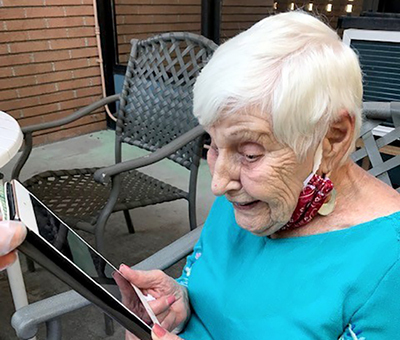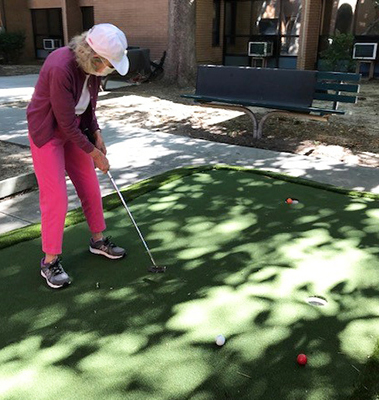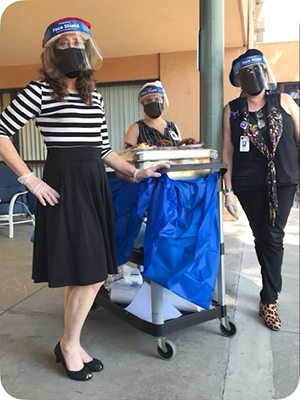Revamped Activities for the Shelter-in-Place Era


Revamped Activities for the Shelter-in-Place Era

At the Los Angeles Jewish Home, we nurture the minds, bodies, souls and spirits of our residents. And, in the midst of the coronavirus pandemic, we are developing fresh—yet familiar—ways to engage with the seniors who are in our care and currently sheltering in place.
Members of our activities teams have partnered with our culinary, physical therapy and spiritual life teams to come up with mental- and physical health-enhancing activities that our residents can enjoy even while socially distancing.
Annette Weinberg, Lifestyle and Enrichment Director for the residential care community at Eisenberg Village (EV), hosts internationally themed "Nosh & Nibbles" events, featuring treats and music from a different country on a weekly basis.
For resident birthdays, she is making sure no one feels forgotten. She is delivering sweet treats and a birthday card, posting a birthday sign, as well as singing and dancing outside their doors.
Weinberg is also collaborating with the Physical Therapy department to offer a Fitness Challenge three times a week. Residents – limited to three at a time for social distancing purposes—take part in a series of fitness activities such as bean bag toss, wall pushups, tai chi, golf (putting skills), and water bottle bowling. "Three of us work with the residents, so each gets one-on-one attention," she says.
Responsive to Requests
At the Goldenberg•Ziman Special Care Center and Max Factor Family Foundation Nursing Buildings, Activities Team Leader Sandra Valdovinos, hosts activities geared toward residents with Alzheimer's disease or other forms of dementia. To help keep residents' minds alert, Valdovinos organizes sing-a-longs (their favorite song is "For Me and My Gal"), word games, craft projects and – of course — Bingo, all while keeping everyone a safe six-feet apart.
While the activities—such as Bingo and the crafts, for instance—were once communal, Valdovinos has adapted them so individual residents can partake.
She is also responding to resident requests for additional activities. "They tell us what they want," Valdovinos explains. Some of the new activities including distributing more challenging word games and crossword puzzles for residents who are up for more intellectual stimulation.

The Sunshine Group
Josie Mata, activities leader at the Home's Mark Taper Skilled Nursing Building, and her team have also adapted their activities, including what they call the "Sunshine Group."
"We take residents out into the courtyard and they listen to music played through a speaker. While outside, they enjoy some fresh air and do some exercises, all staying six-feet apart from each other in small groups," she says. "Our residents especially love this activity these days because they get to have a break from being in their rooms and breathe fresh air—all while singing and dancing along to their favorite songs."
To keep residents in touch with family members and loved ones, Mata and her team have started to do video calls via Facetime and Zoom. "That's something we have never done before," she says. "It's great because the calls benefit both the families and the residents. We use iPad tablets, which were donated to the Home. We disinfect them before and after each resident uses them."
"Being able to see each other's faces and talk to their families means a lot to our residents," she says.
Lifeline
Recently, while watching the nightly news, Fountainview at Eisenberg Village resident Joy Picus, a former Los Angeles city councilmember, noticed a high number of female doctors were being interviewed as medical experts. She reflected on how, when she was in college, it was rare for women to attend medical school and actually shocking if a woman practiced medicine.
The world had changed, she thought, for the better.
Picus realized that this was a positive takeaway during the COVID-19 crisis and wondered if anyone else had noticed similar bright spots standing out from the bleak news of the day. Problem was, being shut in her room, how would she learn what was on the minds of other residents?
She reached out to Activities Coordinator Lauri Kamiel and Lifestyle & Enrichment Director Carolyn Clark. They happily organized "Joy's Takeaway," a Thursday afternoon conference call that Fountainview at Eisenberg Village residents could join.
More than 20 residents hopped on the call, contributing their own takeaways. Some shared how they were reminding themselves to be patient, to take every day as it comes.
Others wanted to share some good news, such as a granddaughter graduating medical school; another graduating high school, and one continuing her education to business school.
"Mazel tov!" a chorus of residents gleefully shouted.
"This has been a lifeline," one resident said as the call was ending. "It really helps."

Personal Pastoral Touch
At Eisenberg Village, Rabbi Ron Goldberg, says his pastoral role has increased with the new sheltering in place rules. With EV residents limited from group activities and visits from family and friends, Rabbi Goldberg is on the lookout for those who may be feeling more isolated than others.
"If I don't see a resident for two days, I go to find them and knock on their door," he says. "I want to just to be certain everything is well. And as I travel the campus, residents want to reach out to me, to talk, to share, to voice their fears and concerns. They are not looking for me to solve the world's problems, but what is of real value to them is my ‘actively listening' to their words and thoughts."
For Rabbi Karen Bender, the Home's Skirball Director of Spiritual Life and the campus rabbi for Grancell Village, the personal dose of pastoral care is manifesting in myriad ways. Rabbi Bender has helped wrap tefillin on a resident who needed help; brought a yahrtzeit candle to a resident who wanted to say Kaddish and delivered a personalized tallit to a resident on her 90th birthday (which was also the day she was supposed to have her adult Bat Mitzvah.)
Technology to the Rescue
As the shelter-in-place rules have restricted gathering together for Shabbat, Rabbi Bender began to implement new technologies such as Zoom, as well as more traditional ones such as television and telephone conference calls (organized by the activities teams at Grancell and Eisenberg Villages), to reach the full spectrum of Jewish Home residents.
Each Friday offers an opportunity for Rabbi Bender to stream the Shabbat experience right into the residents' own rooms. She has even enlisted her two children to join her as she sings songs and offers inspiring messages. "I'm streaming from my home to theirs - this allows for a more hamish, less technical feeling," she says.
Teaming up with Rabbi Goldberg, the two rabbis were able to conduct holiday services for residents at both Grancell and Eisenberg Villages. Together they have broadcast Passover and a Yizkor (memorial) service. Because they usually led services simultaneously at the separate campus, they had never co-led a service before.
"For our residents a chance to see both rabbis at the same time was special," says Rabbi Goldberg. "In our five years of working together, we had not co-officiated a service. We received some grateful feedback from the residents at EV for the Yizkor service."
Rabbi Bender has also featured residents themselves in her videos. To celebrate Yom Haatzmaut, Rabbis Bender and Goldberg recorded residents from both campuses wishing a "Happy Birthday" to Israel. The short video was then broadcast throughout both campuses.
Yet, with all of the revamped activities, there are some that remain reassuringly familiar.
"Our residents always like their extra cup of coffee in the morning," says Valdovinos. "That hasn't changed. I see that as a blessing, that they can start their days with what they love, a cup of coffee."